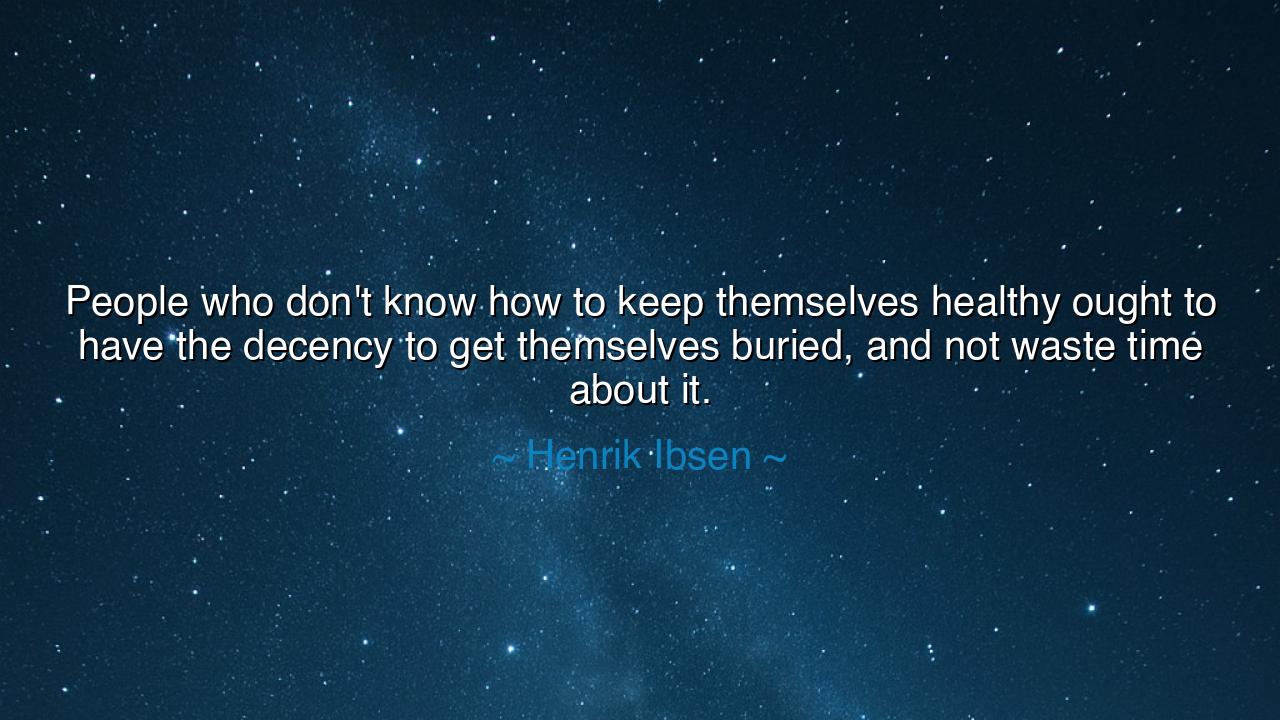
People who don't know how to keep themselves healthy ought to
People who don't know how to keep themselves healthy ought to have the decency to get themselves buried, and not waste time about it.






The words of Henrik Ibsen, “People who don't know how to keep themselves healthy ought to have the decency to get themselves buried, and not waste time about it,” strike like a thunderclap — harsh, uncompromising, and yet deeply truthful in their moral gravity. To the unreflective ear, the words sound cruel; but to the discerning heart, they reveal Ibsen’s fierce devotion to discipline, responsibility, and the sanctity of life itself. He does not speak merely of bodily health, but of the moral duty to live wisely, to honor the gift of existence by caring for the vessel that carries the soul. His tone is not one of contempt for the weak, but of condemnation for the careless — those who, through negligence or indulgence, squander the vitality that is both their power and their duty.
The origin of this quote lies in Ibsen’s lifelong rebellion against stagnation and moral decay. Living in the 19th century, he saw the rise of modern comfort — the softening of character that came when people chose idleness over effort, and self-pity over courage. Through his plays, such as An Enemy of the People and Ghosts, Ibsen condemned the hypocrisy of societies that preached virtue but practiced apathy. His fierce words about health are not a literal wish for the death of the sick — they are a symbolic strike against the disease of complacency. He believed that every human being has a responsibility not only to survive but to strive, to live in a state of moral and physical alertness. Health, for Ibsen, was not only of the body, but of the spirit — and those who abandoned it had already, in his eyes, buried themselves.
In the style of the ancients, this sentiment echoes the Stoic creed: that life itself is a battlefield where strength of body and mind are the armor of virtue. The Roman philosopher Epictetus said that the weak-willed man “dies before his time, though his heart still beats.” Ibsen’s harsh words spring from the same root. To neglect one’s health — whether physical, mental, or moral — is to surrender one’s post in the great struggle of existence. The ancients would have called such neglect a betrayal of the gods, for to them, the body was sacred — the temple of reason, the vessel of the divine flame. Thus, when Ibsen says the unhealthy should “get themselves buried,” he speaks as a prophet of discipline, demanding that mankind wake from its slumber and honor life through self-mastery.
A story from history mirrors this truth. Consider the figure of Ernest Shackleton, the explorer who led his crew through the Antarctic’s most brutal wilderness. When his ship, Endurance, was trapped and crushed by ice, Shackleton refused despair. For two years, in cold and starvation, he kept his men alive through sheer will, leadership, and resilience. He guarded their health as sacred — commanding exercise, ration, and routine even in hopelessness. Not one man died. Shackleton’s triumph was not of conquest, but of vitality — of the will to stay alive with dignity and order. This, Ibsen would have praised. For health, rightly understood, is not ease or comfort, but the courageous harmony between mind and body — the refusal to let weakness rule.
In Ibsen’s philosophy, to be alive is to participate in the moral economy of strength. Those who refuse to care for themselves — who drown their vigor in excess, neglect, or sloth — rob the world of their potential and drain its energy. To him, this is indecency: to exist without reverence for life’s gift. His words are not meant to exclude the infirm or the unfortunate, but to awaken the negligent. For true illness may come to anyone, but indifference is chosen. The sick who fight to live are heroes; the healthy who choose decay are cowards. The former ennoble life through endurance; the latter dishonor it through waste.
There is also a spiritual undertone in Ibsen’s command. He reminds us that life is sacred because it demands responsibility. The body is not merely a possession, but a duty — one we owe to ourselves, to others, and to the generations yet unborn. To neglect it is to break the chain of stewardship. When the ancients trained their warriors, their athletes, their philosophers, they did so not from vanity but from reverence. For in a strong body dwelt a disciplined soul, and in a disciplined soul lay the foundations of civilization. Ibsen’s words, though wrapped in anger, burn with that same sacred fire: a call to rise, to tend, to guard the flame of vitality.
The lesson of his quote is not cruelty but conviction: life demands effort, and health — physical, emotional, and moral — is both a duty and a gift. To live without care for oneself is to waste the energy that could have served creation. Therefore, let each man and woman become the keeper of their own temple. Nourish your body, but also your integrity. Breathe deeply, work honestly, rest wisely, and live consciously. In this way, you honor the divine order within you.
So let the words of Henrik Ibsen endure as both warning and inspiration: those who do not care for their health do not merely endanger their bodies — they betray their very humanity. To live well is to live with respect — for the body, for the spirit, and for the miracle of life itself. Let this be our creed: to live so fully, so vigilantly, that when death finally calls, it finds us not already buried in neglect, but standing upright — strong, alert, and alive in the fullest measure of being.






AAdministratorAdministrator
Welcome, honored guests. Please leave a comment, we will respond soon